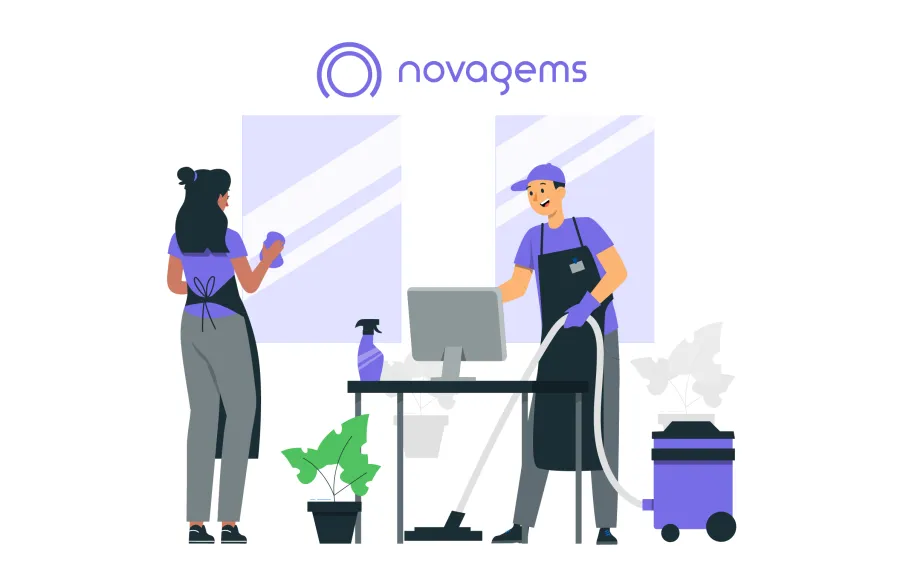Improving Healthcare Staffing with Healthcare Scheduling Software
Wed, Feb 7, 2024
Read in 6 minutes

Effective staffing in healthcare is crucial for providing high-quality patient care. However, the industry faces several staffing challenges, such as rising labor costs, staff burnout, and complex shift management. These challenges can significantly affect the efficiency and effectiveness of healthcare services. Using health care scheduling software can help address these issues. By streamlining shift management, enhancing employee satisfaction, and optimizing resource allocation.
Scheduling software for healthcare has come up as an ideal healthcare solution that will increase retention and solve scheduling problems.
This blog will explore the challenges in healthcare staffing, the role of scheduling software, key features of effective software, and the benefits of its usage.
Understanding the Challenges in Healthcare Staffing
Healthcare staffing is a big issue that affects the quality of patient care. Healthcare facilities face several challenges when it comes to staffing, making it a crucial area to address. Managers and facility owners are always on a lookout for healthcare solutions that will help them provide better care.
-
Rising Labor Costs and Staffing Shortages
One of the biggest challenges is the rising cost of labor. As the demand for healthcare services increases, so does the need for qualified healthcare professionals. However, there is a shortage of these professionals. Especially nurses and specialized medical staff. This shortage drives up labor costs as healthcare facilities compete to hire and retain the best talent. healthcare management wants to retain the best professionals for their facilities, so investing in something like this is a good option.
-
Impact of Staff Burnout on Healthcare Delivery
Staff burnout is another major problem. Health care professionals often work long hours in high-stress environments, leading to burnout. Burnout not only affects the health and well-being of the staff but also impacts the quality of patient care. Burned-out staff are more likely to be absent, less productive, and more likely to leave their jobs. Worsening the staffing shortage and putting a burden on the remaining staff.
-
The complexity of Managing Shifts and Compliance
Managing shifts in healthcare is complex. Healthcare facilities need to ensure they have the right number of staff with the right skills available at all times. This task is made more complicated by the need to comply with various labor laws and regulations. Such as mandatory rest periods and maximum working hours. Failing to comply can result in legal penalties and harm the facility’s reputation.
The Role of Healthcare Scheduling Software
Healthcare scheduling software plays a crucial role in addressing these staffing challenges. By using advanced technology, healthcare facilities can optimize their staffing processes, improve efficiency, and enhance the overall quality of care. Scheduling software will play an important role in providing better healthcare solutions.
-
Streamlining Shift Management
Scheduling software for healthcare automates the process of creating and managing shift schedules. This automation reduces the administrative burden on managers. Allowing them to focus on more important tasks. The software can quickly generate schedules that meet the needs of the facility while ensuring compliance with labor regulations. Making multiple schedules can be a headache for healthcare management. With the software they can simply copy and paste the weeks’ schedules in minutes.
-
Enhancing Employee Satisfaction and Retention
Effective scheduling software can also improve employee satisfaction by providing more predictable and fair scheduling. Features like self-scheduling and shift swapping give employees more control over their work schedules. Hence reducing stress and burnout. Satisfied employees are more likely to stay with their employer, reducing turnover rates.
-
Reducing Reliance on Staffing Agencies
By providing real-time data and analytics, health care scheduling software helps facilities better understand their staffing needs. This insight allows them to reduce their reliance on expensive staffing agencies by optimizing the use of their internal workforce. This reduction in reliance on external agencies can lead to significant cost savings.
Key Features of Effective Healthcare Scheduling Software
Not all healthcare scheduling software is created equal. To be effective, the software must have several key features that address the unique needs of healthcare facilities.
-
User-friendly interface and Mobile Accessibility
A user-friendly interface is essential for ensuring that both managers and staff can easily use the software. Mobile accessibility is also crucial. As it allows health care professionals to access their schedules, make changes, and communicate with their colleagues from anywhere. This is an important feature to look for as healthcare management would want to reduce the extra time spent teaching the features to the staff.
-
Customization and Integration Capabilities
Effective healthcare scheduling software must be customizable to meet the specific needs of the facility. It should integrate seamlessly with other systems used in the organization, such as electronic health records (EHR) and payroll systems. This integration ensures a smooth flow of information and reduces the risk of errors.
-
Compliance and Security Measures
Given the sensitive nature of healthcare data, the software must comply with all relevant regulations, such as HIPAA in the United States. Robust security measures are essential to protect patient information and ensure data integrity. The healthcare management will first look for this and then for other features.
Benefits of Implementing Scheduling Software in Healthcare
Implementing health care scheduling software offers numerous benefits that extend beyond simply improving scheduling processes.
-
Optimizing Resource Allocation
By providing real-time data on staffing levels and patient needs, scheduling software helps healthcare facilities optimize their resource allocation. This optimization ensures that the right number of staff with the appropriate skills are available at all times. Improving patient care and operational efficiency.
-
Improving Patient Care and Safety
Properly managed staffing levels directly impact patient care and safety. With healthcare scheduling software, facilities can ensure that they have adequate staff coverage. Reducing the risk of errors and improving patient outcomes. The software can also help in assigning the most experienced and qualified staff to critical shifts, further enhancing the quality of care.
-
Ensuring Fair Work Allocation
Fair work allocation is essential for maintaining staff morale and job satisfaction. Scheduling software can help ensure that shifts are distributed fairly among employees. This helps in preventing favoritism and bias. This fairness can lead to a more positive work environment, which in turn can improve patient care. This will increase communication and work environment in the health care sector.
Conclusion
Health care scheduling software is a powerful tool that can address many of the staffing challenges faced by healthcare facilities. By streamlining shift management, enhancing employee satisfaction, and optimizing resource allocation, this technology can significantly improve the efficiency and quality of healthcare delivery. As the healthcare industry continues to evolve. The adoption of advanced scheduling solutions will be crucial in ensuring that healthcare organizations can meet the growing demand for their services while maintaining high standards of care.
Get a Free Trial
Sign up For Newsletter
Latest Blog Posts
Get Started
Start being productive & grow your business
with Novagems




